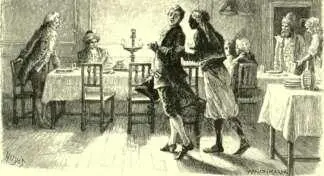“I see a prodigious number of plays,” said Candide, “in Italian, Spanish, and French.” “Yes,” replied the Venetian; “there are I think three thousand, and not three dozen of them good for anything. As to those huge volumes of divinity, and those enormous collections of sermons, they are not all together worth one single page in Seneca; and I fancy you will readily believe that neither myself, nor anyone else, ever looks into them.”
Martin, perceiving some shelves filled with English books, said to the senator: “I fancy that a republican must be highly delighted with those books, which are most of them written with a noble spirit of freedom.” “It is noble to write as we think,” said Pococuranté; “it is the privilege of humanity. Throughout Italy we write only what we do not think; and the present inhabitants of the country of the Cæsars and Antonines dare not acquire a single idea without the permission of a Dominican father. I should be enamored of the spirit of the English nation, did it not utterly frustrate the good effects it would produce by passion and the spirit of party.”
Candide, seeing a Milton, asked the senator if he did not think that author a great man. “Who?” said Pococuranté sharply; “that barbarian who writes a tedious commentary in ten books of rumbling verse, on the first chapter of Genesis? that slovenly imitator of the Greeks, who disfigures the creation, by making the Messiah take a pair of compasses from heaven’s armory to plan the world; whereas Moses represented the Deity as producing the whole universe by his fiat? Can I think you have any esteem for a writer who has spoiled Tasso’s hell and the devil; who transforms Lucifer sometimes into a toad, and at others into a pygmy; who makes him say the same thing over again a hundred times; who metamorphoses him into a school-divine; and who, by an absurdly serious imitation of Ariosto’s comic invention of firearms, represents the devils and angels cannonading each other in heaven? Neither I nor any other Italian can possibly take pleasure in such melancholy reveries; but the marriage of Sin and Death, and snakes issuing from the womb of the former, are enough to make any person sick that is not lost to all sense of delicacy. This obscene, whimsical, and disagreeable poem met with the neglect it deserved at its first publication; and I only treat the author now as he was treated in his own country by his contemporaries.”
Candide was sensibly grieved at this speech, as he had a great respect for Homer, and was fond of Milton. “Alas!” said he softly to Martin, “I am afraid this man holds our German poets in great contempt.” “There would be no such great harm in that,” said Martin. “O what a surprising man!” said Candide, still to himself; “what a prodigious genius is this Pococuranté! nothing can please him.”
After finishing their survey of the library, they went down into the garden, when Candide commended the several beauties that offered themselves to his view. “I know nothing upon earth laid out in such bad taste,” said Pococuranté; “everything about it is childish and trifling; but I shall have another laid out to-morrow upon a nobler plan.”
As soon as our two travellers had taken leave of his excellency, “Well,” said Candide to Martin, “I hope you will own that this man is the happiest of all mortals, for he is above everything he possesses.” “But do not you see,” answered Martin, “that he likewise dislikes everything he possesses? It was an observation of Plato, long since, that those are not the best stomachs that reject, without distinction, all sorts of aliments.” “True,” said Candide, “but still there must certainly be a pleasure in criticising everything, and in perceiving faults where others think they see beauties.” “That is,” replied Martin, “there is a pleasure in having no pleasure.” “Well, well,” said Candide, “I find that I shall be the only happy man at last, when I am blessed with the sight of my dear Cunegund.” “It is good to hope,” said Martin.
In the meanwhile, days and weeks passed away, and no news of Cacambo. Candide was so overwhelmed with grief, that he did not reflect on the behavior of Pacquette and Friar Giroflée, who never stayed to return him thanks for the presents he had so generously made them.


CHAPTER XXVI.
CANDIDE AND MARTIN SUP WITH SIX SHARPERS — WHO THEY WERE.
Table of Contents
One evening as Candide, with his attendant Martin, was going to sit down to supper with some foreigners who lodged in the same inn where they had taken up their quarters, a man with a face the color of soot came behind him, and taking him by the arm, said, “Hold yourself in readiness to go along with us; be sure you do not fail.” Upon this, turning about to see from whom these words came, he beheld Cacambo. Nothing but the sight of Miss Cunegund could have given him greater joy and surprise. He was almost beside himself. After embracing this dear friend, “Cunegund!” said he, “Cunegund is come with you doubtless! Where, where is she? Carry me to her this instant, that I may die with joy in her presence.” “Cunegund is not here,” answered Cacambo; “she is in Constantinople.” “Good heavens! in Constantinople! but no matter if she were in China, I would fly thither. Quick, quick, dear Cacambo, let us be gone.” “Soft and fair,” said Cacambo, “stay till you have supped. I cannot at present stay to say anything more to you; I am a slave, and my master waits for me; I must go and attend him at table: but mum! say not a word, only get your supper, and hold yourself in readiness.”
Candide, divided between joy and grief, charmed to have thus met with his faithful agent again, and surprised to hear he was a slave, his heart palpitating, his senses confused, but full of the hopes of recovering his dear Cunegund, sat down to table with Martin, who beheld all these scenes with great unconcern, and with six strangers, who had come to spend the carnival at Venice.
Cacambo waited at table upon one of those strangers. When supper was nearly over, he drew near to his master, and whispered in his ear, “Sire, your majesty may go when you please; the ship is ready”; and so saying he left the room. The guests, surprised at what they had heard, looked at each other without speaking a word; when another servant drawing near to his master, in like manner said, “Sire, your majesty’s post-chaise is at Padua, and the bark is ready.” The master made him a sign, and he instantly withdrew. The company all stared at each other again, and the general astonishment was increased. A third servant then approached another of the strangers, and said, “Sire, if your majesty will be advised by me, you will not make any longer stay in this place; I will go and get everything ready”; and instantly disappeared.
Candide and Martin then took it for granted that this was some of the diversions of the carnival, and that these were characters in masquerade. Then a fourth domestic said to the fourth stranger, “Your majesty may set off when you please;” saying which, he went away like the rest. A fifth valet said the same to a fifth master. But the sixth domestic spoke in a different style to the person on whom he waited, and who sat near to Candide. “Troth, sir,” said he, “they will trust your majesty no longer, nor myself neither; and we may both of us chance to be sent to jail this very night; and therefore I shall take care of myself, and so adieu.” The servants being all gone, the six strangers, with Candide and Martin, remained in a profound silence. At length Candide broke it by saying, “Gentlemen, this is a very singular joke upon my word; how came you all to be kings? For my part I own frankly, that neither my friend Martin here, nor myself, have any claim to royalty.”
Читать дальше














